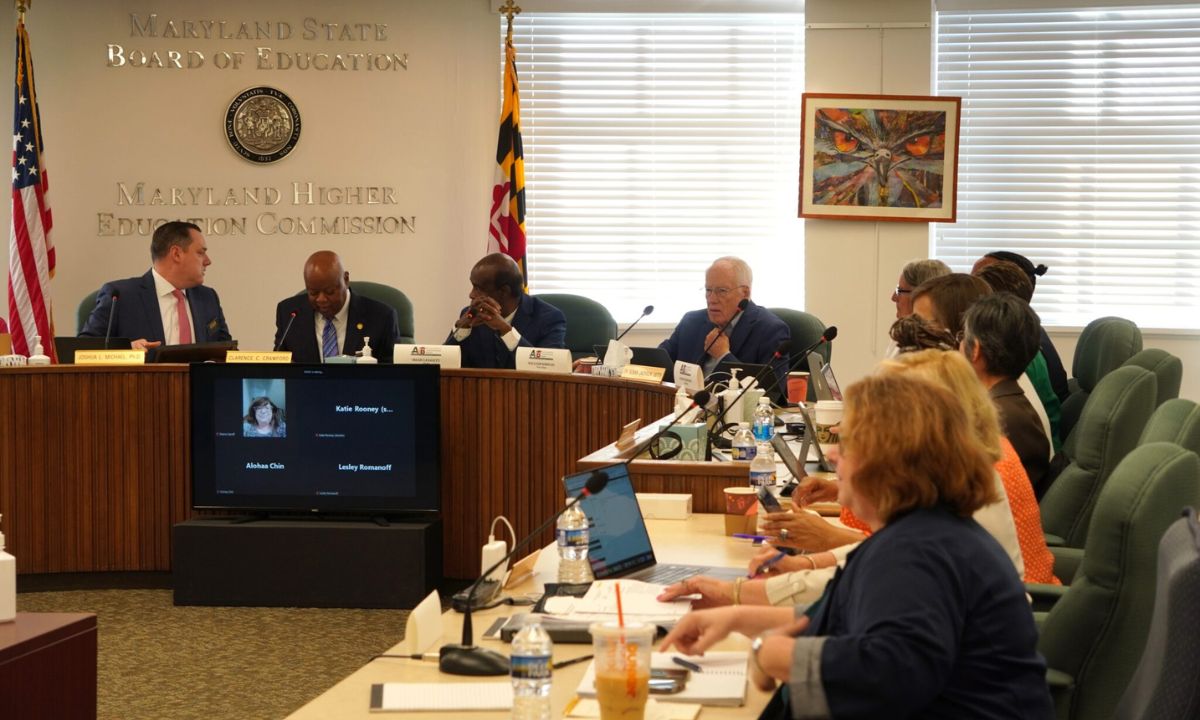Agencies That Oversee Maryland School Reform Agree to Clarify Roles
Superintendents said months ago that spelling out roles of Accountability and Implementation Board, Department of Education would be ‘very beneficial’

Get stories like this delivered straight to your inbox. Sign up for The 74 Newsletter
Local school systems straining to comply with the state’s sweeping Blueprint for Maryland’s Future have had to report to both the Maryland Department of Education and the Blueprint’s Accountability and Implementation Board, a setup creating confusion “since the get-go.”
Now, more than three years into the process, the two agencies said they are working on a memorandum of understanding that could make things a bit smoother for all concerned.
Alex Reese, chief of staff with the Maryland State Department of Education (MSDE), did not tell the state Board of Education on Thursday how long it would take to finalize an agreement, but he said a memorandum is in the works.
State law requires the seven-member AIB to oversee the 10-year plan and approve any Blueprint documents submitted by the state’s 24 school systems and other state agencies that craft elements of the Blueprint.
The law also requires the department to provide technical assistance and lend expertise on education policy. The AIB and state Board of Education also hold occasional joint meetings and approve certain policies associated with the multibillion-dollar Blueprint plan.
Reese said “MSDE will be fully owning Blueprint implementation. We feel good about that as practitioners. We really do feel like we possess that expertise to be able to be poised to fully implement the Blueprint.”
An AIB spokesperson confirmed in an email Thursday evening an agreement is being worked on with the department.
“AIB and MSDE attorneys are working together on an MOU [memorandum of understanding] relating to the agencies’ respective roles and duties,” the spokesperson said.
“There is not currently a timeline confirmed for finalizing it. Because it is an MOU directly between the AIB and MSDE, there would be no need for General Assembly approval,” the email said.
In a quick summation to the state board Thursday, Reese said certain processes will remain the same such as the Blueprint board providing instructions to school systems on what is required in each Blueprint plan. It will continue “interagency collaboration” with agencies such as the state Higher Education Commission, which focuses on two of the Blueprint’s five pillars, or priorities – hiring and retaining high-quality and diverse teachers, and preparing students for college and technical careers.
The news was welcomed by school leaders, educators and advocates who have expressed frustration over the process of implementing the comprehensive education reform plan.
“One of the biggest complaints, if not the biggest, has been the lack of clarity and final guidance and where we get questions answered. We’ve got to run every decision by both entities [MSDE and AIB],” said Mary Pat Fannon, executive director of the Public School Superintendents’ Association of Maryland.
The association released a 12-page document in December that outlined proposals to help improve the plan. One of those recommendations was clearing up the relationship between the two agencies.
“Restructuring and clarifying the relationship of the MSDE and AIB would be very beneficial in the implementation of the Blueprint. This change would clarify roles and responsibilities, and establish clear guidance to the LEAs [local education agencies, or school systems] that they are governed by the procedures and processes promulgated by the MSDE and the State Board,” the December report said.
“Somebody’s got to be the point. Somebody’s got to be the team captain on certain things,” Fannon said. “Otherwise, it’s just completely frustrating.”
“We are happy they are doing this. This is all going to help in implementation when these guys are 100% clear with us,” Fannon said of the work on an MOU.
Sen. Mary Beth Carozza (R-Lower Shore) was also pleased by the discussions, which she said would help improve the process at the local and state levels. But the senator hopes an agreement can be reached before the 2025-26 school year begins in the fall.
“I would like to think they would make every effort to use the time between now and [when] school starts to give as much clarity to the roles and responsibilities, since it will only have a positive impact at the local level,” Carozza said. “That would be my expectation to keep that on track and to keep it moving.”
Maryland Matters is part of States Newsroom, a nonprofit news network supported by grants and a coalition of donors as a 501c(3) public charity. Maryland Matters maintains editorial independence. Contact Editor Steve Crane for questions: editor@marylandmatters.org.
Get stories like these delivered straight to your inbox. Sign up for The 74 Newsletter

;)